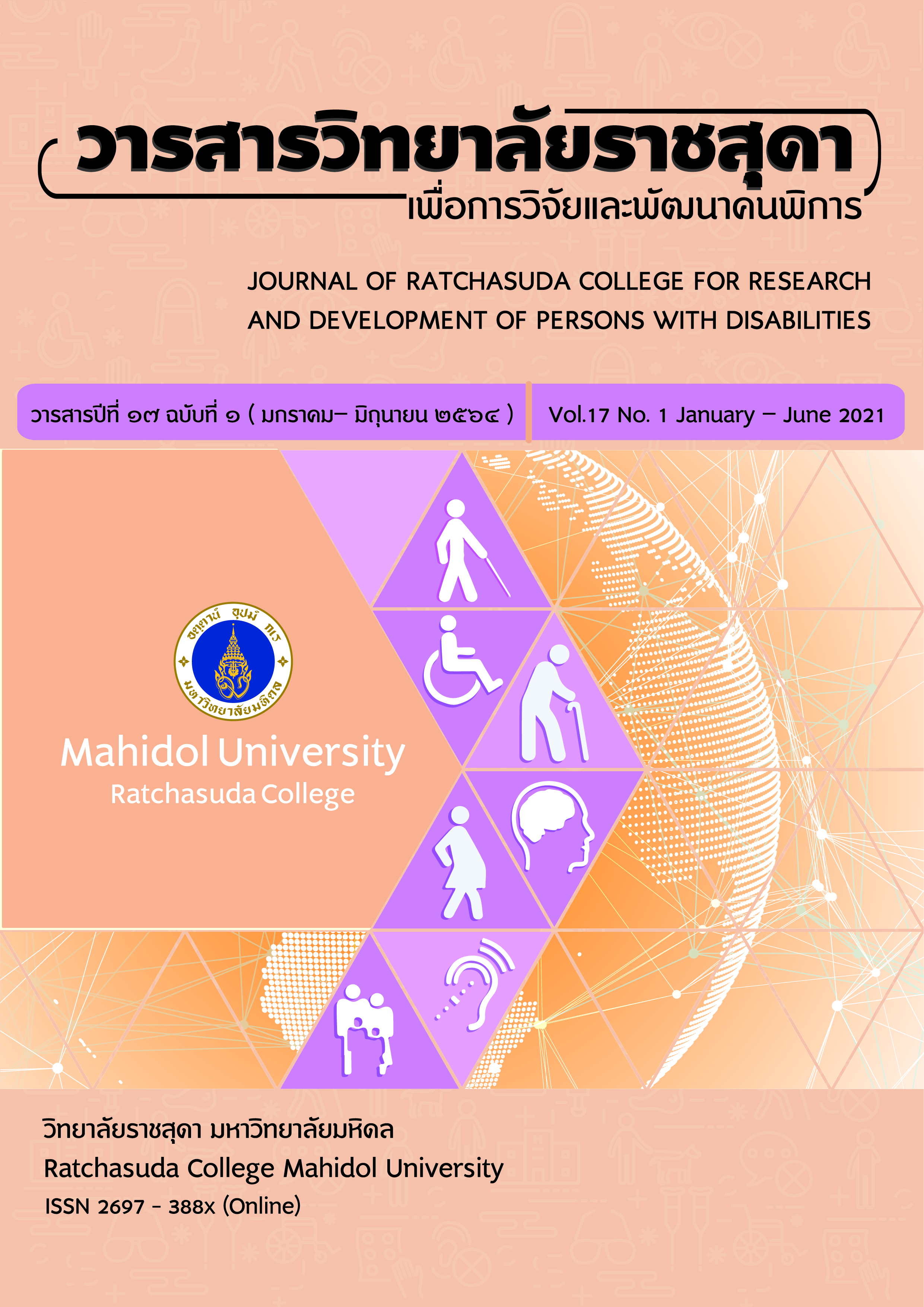The Variety of Institutional Logics under Community - Based Rehabilitation Project in Thailand
Keywords:
institutional logics, community-based rehabilitation, people with disabilities, public policyAbstract
This research explains institutional logics under Community-Based Rehabilitation (CBR) project based on the theory of institutional logics perspective that influences the practices of those involved with the CBR. Those logics are interrelated and affect the operations of the CBR project. This study is done using the qualitative research methodology. Research data collected from relevant documents, research, and in-depth interviews with 18 people involved with the CBR project. These data were analyzed and discussed according to the institutional logics perspective framework. The results show that the CBR project is influenced by six institutional logics; state logic, professional logic, community logic, family logic, market logic and religion logic. Further results show that, the CBR project is a project with a variety of perspectives, beliefs and norms that lead to different approaches and behaviors through actors. Six of those institutional logics have relationships in three forms: consistent relationships, conflict relationships and competition among institutional logics. The variety of institutional logics and three types of relationships do not make the CBR project as a hybrid organization that may flexibly respond to the environment, but rather it reinforces the norm of strict state control contrary to fully participation of the community organization under community logic, in accordance with the CBR principles.
Downloads
References
Bualar, T., & Ahmad, M. M. (2009). Why does Community-Based Rehabilitation fail physically disabled women in northern Thailand? Development in Practice. https://doi.org/10.1080/09614520802576351
Cheausuwantavee, T. (2009). Prospective on disability through concept and theory. Bangkok, Thailand: Tana Press, Ltd.
Cheausuwantavee, T. (2005). Original Articles Community Based Rehabilitation in Thailand: Asia Pacific Disability Rehabilitation Journal.
Fligstien Neil. (1990). The Transformation of Corporate Control. Cambridge, MA: Harvard University Press.
Friedland, Roger, and Alford, R. (1991). Bringing Society Back In: Symbols, Practices, and Institutional Contradictions. Chicago: University of Chicago Press.
Glynn, M. A. (2013). Patricia Thornton, William Ocasio, and Michael Lounsbury: The Institutional Logics Perspective: A New Approach to Culture, Structure, and Process. Administrative Science Quarterly. https://doi.org/10.1177/0001839213492139
Granovetter Mark. (1985). Economic Action and Social Structure: The Problem of Embeddedness. American Journal of Sociology, 91, 481–510.
Lounsbury, M. (2007). A TALE OF TWO CITIES: COMPETING LOGICS AND PRACTICE VARIATION IN THE PROFESSIONALIZING OF MUTUAL FUNDS, 50(2), 289–307.
Lukia Namaganda Hamid MPH. (2017). Disability Characteristics of Community-Based Rehabilitation Participants in Kayunga District, Uganda. Annals of Global Health, 83(3–4), 478–388. https://doi.org/https://doi.org/10.1016/j.aogh.2017.10.006
McMullin, C., & Skelcher, C. (2018). The Impact of Societal-Level Institutional Logics on Hybridity: Evidence from Nonprofit Organizations in England and France. Voluntas, 29(5), 911–924. https://doi.org/10.1007/s11266-018-9996-8
Meyer, J. W., & Rowan, B. (1977). Institutionalized Organizations: Formal Structure as Myth and Ceremony. American Journal of Sociology, 83(2), 340–363. https://doi.org/10.1086/226550
Nicholls, A., & Huybrechts, B. (2016). Sustaining Inter-organizational Relationships Across Institutional Logics and Power Asymmetries: The Case of Fair Trade. Journal of Business Ethics. https://doi.org/10.1007/s10551-014-2495-y
Samakeetham, S. (2010). The establishment of power of the powerless (1st ed.). Bangkok, Thailand: MachalongBoon CSB Co., Ltd.
Scott, W. R. (1995). INSTITUTIONS AND ORGANIZATIONS. IDEAS, INTERESTS AND IDENTITIES. International Journal of Pharmacy and Pharmaceutical Sciences, 5(4), 553–555. https://doi.org/10.3917/mana.172.0136
Thornton, P. H., & Ocasio, W. (1999). Institutional Logics and the Historical Contingency of Power in Organizations: Executive Succession in the Higher Education Publishing Industry, 1958– 1990. American Journal of Sociology, 105(3), 801–843
https://doi.org/10.1086/210361
Thornton, P. H., Ocasio, W., & Lounsbury, M. (2012). Introduction to the institutional logics perspective. In The institutional logics perspective: a new approach to culture, structure, and process. https://doi.org/10.1093/acprof
Thornton, P. O. W. L. M. (2013). The Institutional Logics Perspective. United Kingdom: Oxford University Press.
van den Broek, J., Boselie, P., & Paauwe, J. (2014). Multiple Institutional Logics in Health Care: “Productive Ward: Releasing Time to Care.” Public Management Review, 16(1), 1–20. https://doi.org/10.1080/14719037.2013.770059
Zhou, X., and Ai, Y. (2010). Multiple Logics of Institutional Change: Toward and Analytical Framework. Social Science in China, 4, 135–150.
Downloads
Published
How to Cite
Issue
Section
License
บทความที่ได้รับการตีพิมพ์เป็นลิขสิทธิ์ของวารสารสถาบันราชสุดาเพื่อการวิจัยและพัฒนาคนพิการ






